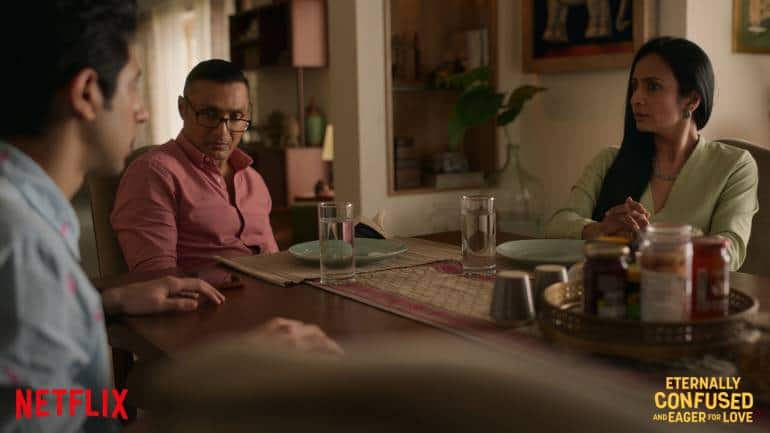



Ray (Vihaan Samat), in his early 20s, is unlucky in love and understandably, excruciatingly horny. He has a boring backend job in a Japanese company, and his self-absorbed parents (Suchitra Pillai and Rahul Bose) wish he was luckier and try their best to salvage him. His work buddy (Ankur Rathee), about to get hitched himself, derives gratuitous pleasure seeing him fail in every well-meaning move with women. His only friend Riya (Dalai) is seemingly a sympathiser, but with love blocks of her own, is unable to change Ray’s situation. But what makes life insufferable for him is himself—more specifically his inner self who gives him reality bites through constant comments on his every decision, every date and every move to get close to a suitable girl (voiced by Jim Sarbh).
So who will Ray end up with? Will he at least come of age?
Produced by Excel Entertainment and Tiger Baby Films, and directed and written by debutant Rahul Nair, Eternally Confused and Eager for Love (ECEFL) is the first Indian entry into Netflix’s horny-young-shy-boys-behaving-weirdly category of TV dramas that has found a devoted following in the past few years. Think Elite, Sex Education, Never Have I Ever and even the '90s’ evergreen sitcom Friends. Ray and Riya even promise each other to be each other’s married partners if they don’t find the one by the time they are 40—a retro dud, for sure.
Replete with post-millennial lexicon, the 8-episodes show has an authentic ring when it comes to language. It is almost entirely written in English—the way an upwardly mobile 24-year-old in Mumbai would talk to his peers and parents. But with a Samurai-like toy which is Ray’s alter ego and which he carries with him wherever he goes, constantly berating, mocking and upsetting Ray with his wisecracks, the narrative voice-over—and by extension, Ray himself—devolves the show into a tediously literal thesis on what the protagonist’s struggles are. The inner voice is more a villain; and not a propeller to the protagonist’s development as a character.
Samat, in his debut role, is immersive as the confused, sex-starved man. He projects the character’s unease in the woke world of post-millennial social interaction efficiently. But given every thought and every tug of war in his head is literally explained via the inner voice, the character is more an amalgamation of his thoughts. He has no redemptive moments and even when the stray one comes along, the writer-director is more interested in making him float along in his uncertainties than give Ray a convincing character arc.
 (Image via Netflix)
(Image via Netflix)
Bose and Pillai are epitomes of woke, over-involved parenting and both efficiently fit the parts. The two other actors in important roles—Dalai and Ankur Rathee—are largely uneven in their performances, and Sarbh’s doomsday pearls have an old-world recitation-style tone which bogs down the watching experience after a couple of episodes.
Technically competent, but without any signature visual language, ECEFL is a forerunner in this genre from India, and its wokeness is possibly its best part. Articulate 20-plus-year-old women, uninhibited in sexual choices, and in opining on everything from mansplaining to manifesting, add to the show’s novelty factor. But because Ray as a character doesn’t intrigue or move the viewer enough to want to be invested in his vicissitudes, ECEFL isn’t the kooky, fun sitcom-like series it is meant to be. ECEFL, though, is a cool Gen Z-speak acronym we could start using right away—to describe anyone who is forever stuck in the dating game without hope in sight.
Discover the latest Business News, Sensex, and Nifty updates. Obtain Personal Finance insights, tax queries, and expert opinions on Moneycontrol or download the Moneycontrol App to stay updated!
Find the best of Al News in one place, specially curated for you every weekend.
Stay on top of the latest tech trends and biggest startup news.